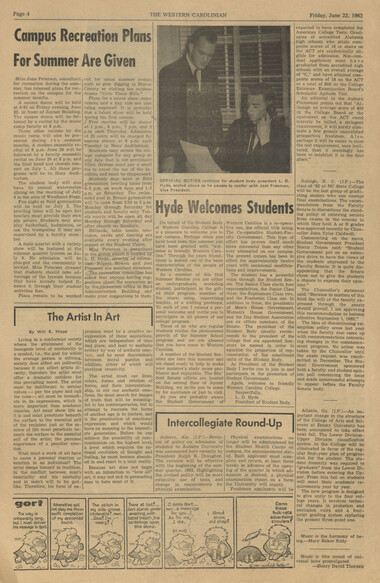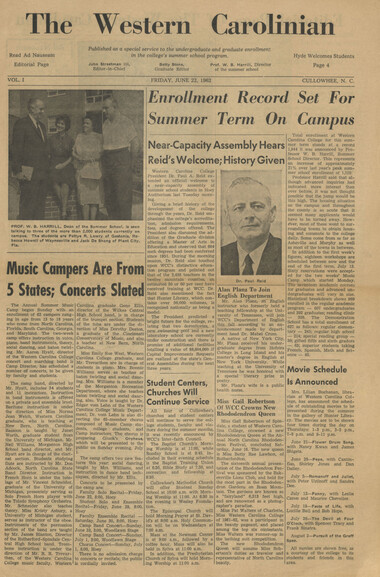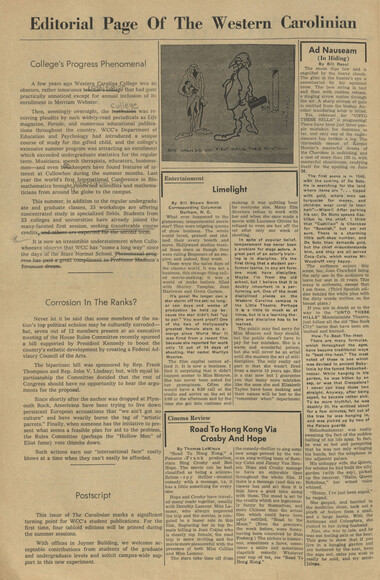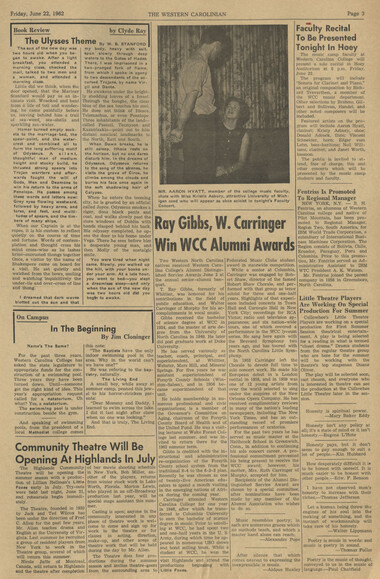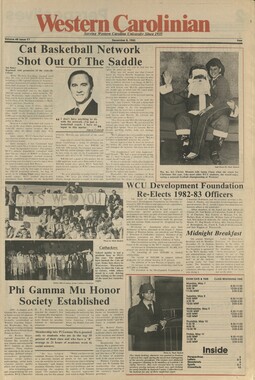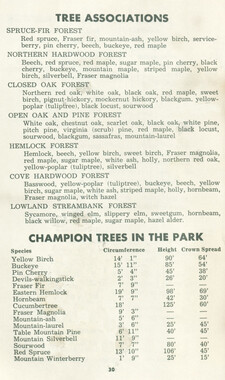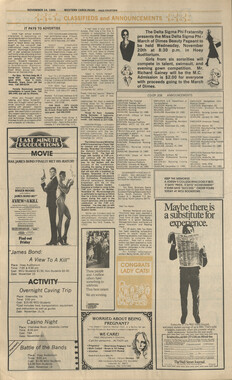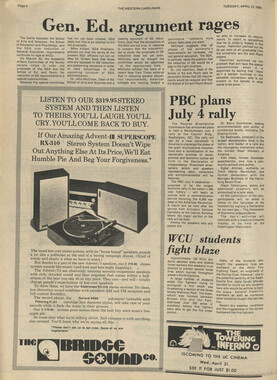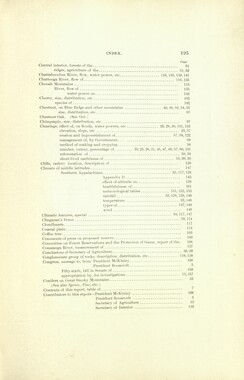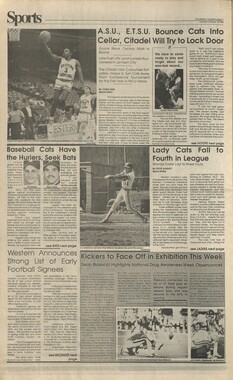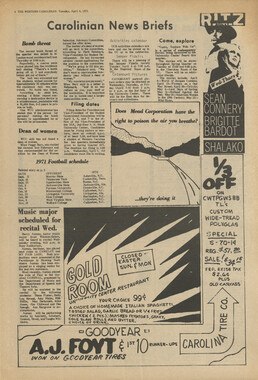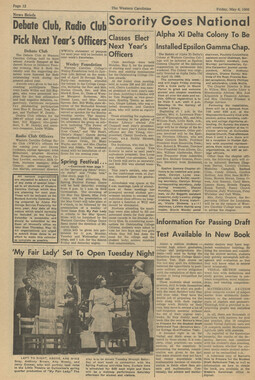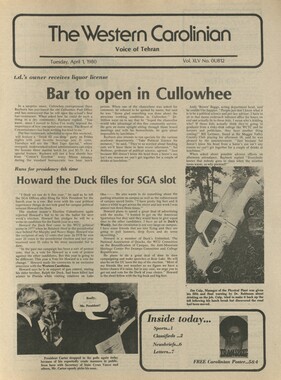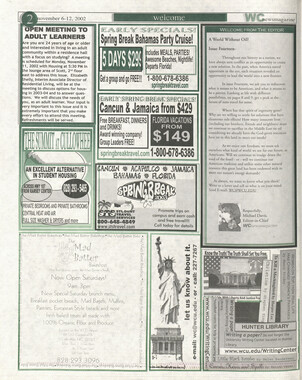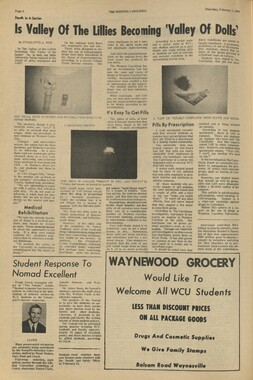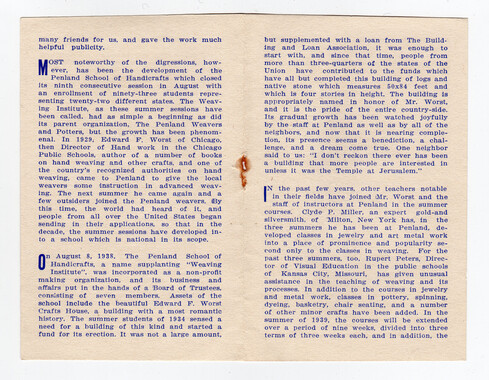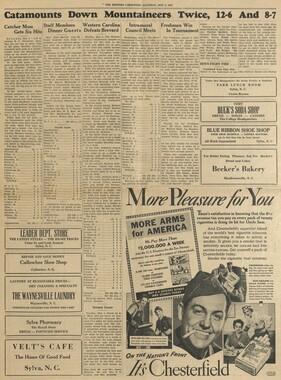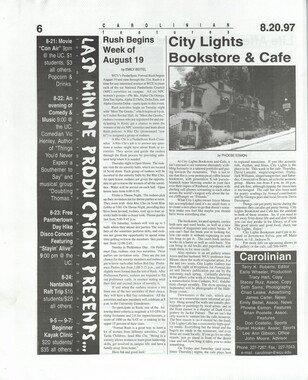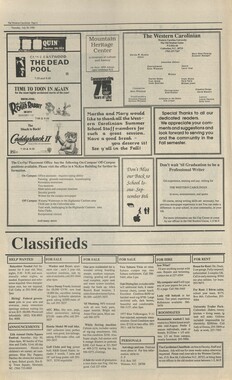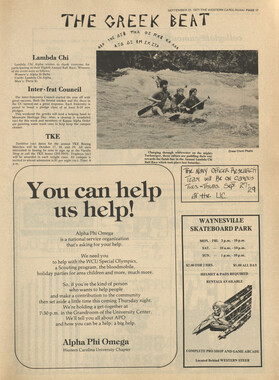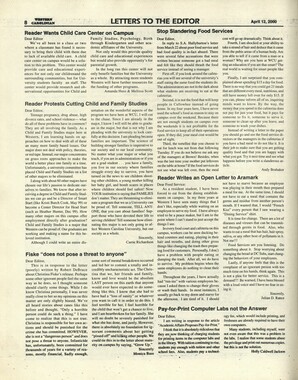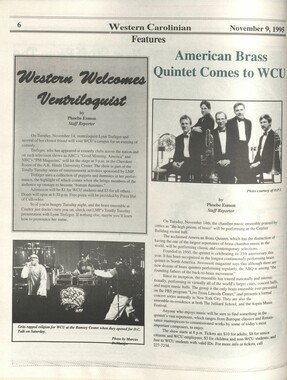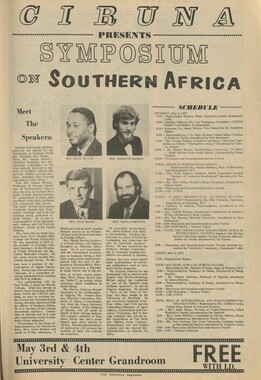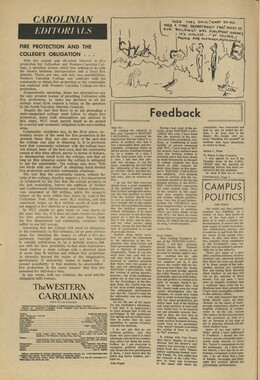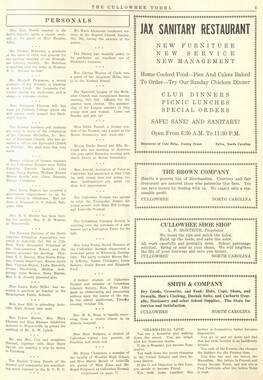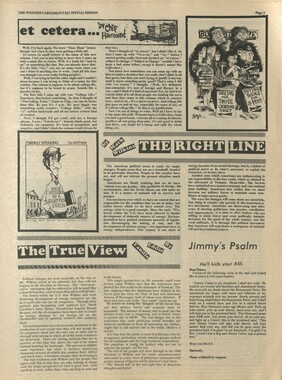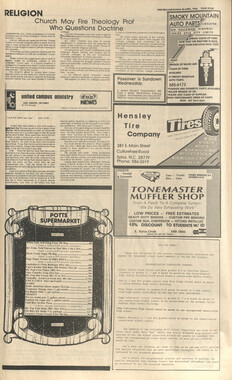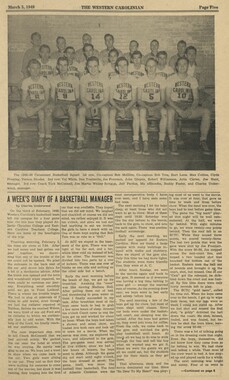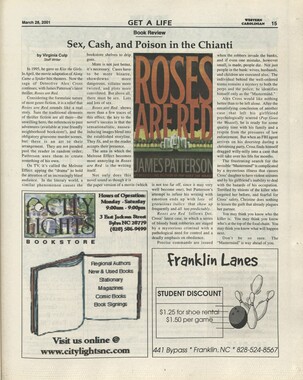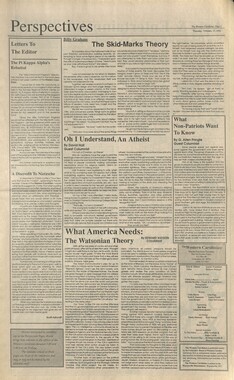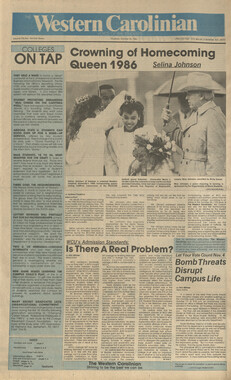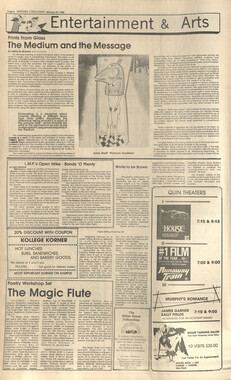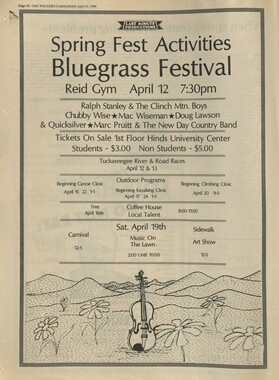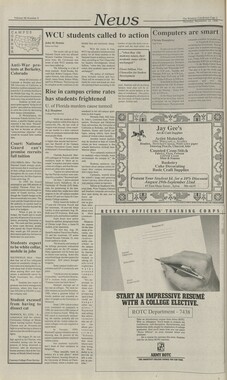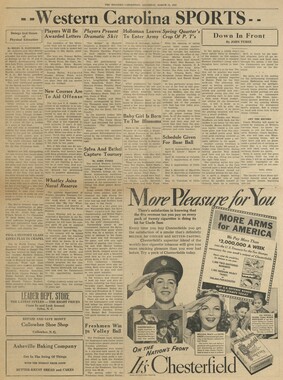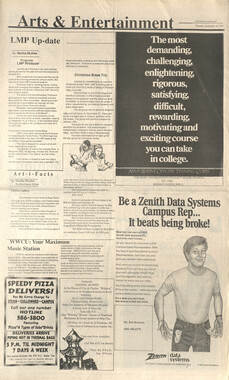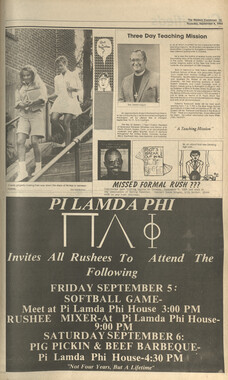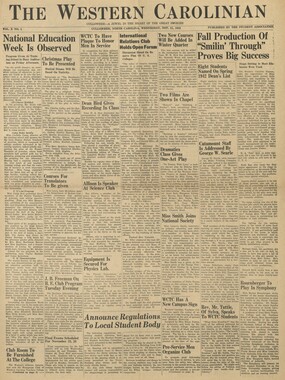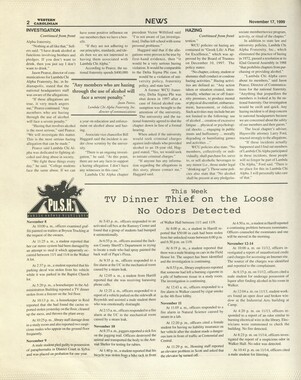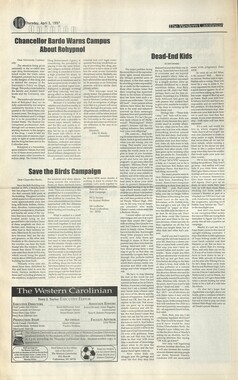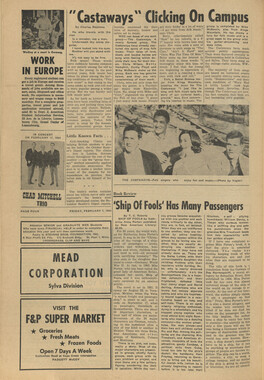Western Carolina University (20)
View all
- Canton Champion Fibre Company (2308)
- Cherokee Traditions (293)
- Civil War in Southern Appalachia (165)
- Craft Revival (1942)
- Great Smoky Mountains - A Park for America (2767)
- Highlights from Western Carolina University (430)
- Horace Kephart (941)
- Journeys Through Jackson (154)
- LGBTQIA+ Archive of Jackson County (26)
- Oral Histories of Western North Carolina (314)
- Picturing Appalachia (6772)
- Stories of Mountain Folk (413)
- Travel Western North Carolina (160)
- Western Carolina University Fine Art Museum Vitreograph Collection (129)
- Western Carolina University Herbarium (92)
- Western Carolina University: Making Memories (708)
- Western Carolina University Publications (2283)
- Western Carolina University Restricted Electronic Theses and Dissertations (146)
- Western North Carolina Regional Maps (71)
- World War II in Southern Appalachia (131)
University of North Carolina Asheville (6)
View all
- Allanstand Cottage Industries (62)
- Appalachian National Park Association (53)
- Bennett, Kelly, 1890-1974 (1388)
- Berry, Walter (76)
- Brasstown Carvers (40)
- Carver, George Washington, 1864?-1943 (26)
- Cathey, Joseph, 1803-1874 (1)
- Champion Fibre Company (233)
- Champion Paper and Fibre Company (297)
- Cherokee Indian Fair Association (16)
- Cherokee Language Program (22)
- Crowe, Amanda (40)
- Edmonston, Thomas Benton, 1842-1907 (7)
- Ensley, A. L. (Abraham Lincoln), 1865-1948 (275)
- Fromer, Irving Rhodes, 1913-1994 (70)
- George Butz (BFS 1907) (46)
- Goodrich, Frances Louisa (120)
- Grant, George Alexander, 1891-1964 (96)
- Heard, Marian Gladys (60)
- Kephart, Calvin, 1883-1969 (15)
- Kephart, Horace, 1862-1931 (313)
- Kephart, Laura, 1862-1954 (39)
- Laney, Gideon Thomas, 1889-1976 (439)
- Masa, George, 1881-1933 (61)
- McElhinney, William Julian, 1896-1953 (44)
- Niggli, Josephina, 1910-1983 (10)
- North Carolina Park Commission (105)
- Osborne, Kezia Stradley (9)
- Owens, Samuel Robert, 1918-1995 (11)
- Penland Weavers and Potters (36)
- Roberts, Vivienne (15)
- Roth, Albert, 1890-1974 (142)
- Schenck, Carl Alwin, 1868-1955 (1)
- Sherrill's Photography Studio (2565)
- Southern Highland Handicraft Guild (127)
- Southern Highlanders, Inc. (71)
- Stalcup, Jesse Bryson (46)
- Stearns, I. K. (213)
- Thompson, James Edward, 1880-1976 (226)
- United States. Indian Arts and Crafts Board (130)
- USFS (683)
- Vance, Zebulon Baird, 1830-1894 (1)
- Weaver, Zebulon, 1872-1948 (58)
- Western Carolina College (230)
- Western Carolina Teachers College (282)
- Western Carolina University (1794)
- Western Carolina University. Mountain Heritage Center (18)
- Whitman, Walt, 1819-1892 (10)
- Wilburn, Hiram Coleman, 1880-1967 (73)
- Williams, Isadora (3)
- Cain, Doreyl Ammons (0)
- Crittenden, Lorraine (0)
- Rhodes, Judy (0)
- Smith, Edward Clark (0)
- Appalachian Region, Southern (2399)
- Asheville (N.C.) (1917)
- Avery County (N.C.) (26)
- Blount County (Tenn.) (161)
- Buncombe County (N.C.) (1671)
- Cherokee County (N.C.) (283)
- Clay County (N.C.) (555)
- Graham County (N.C.) (233)
- Great Smoky Mountains National Park (N.C. and Tenn.) (510)
- Haywood County (N.C.) (3522)
- Henderson County (N.C.) (70)
- Jackson County (N.C.) (4692)
- Knox County (Tenn.) (25)
- Knoxville (Tenn.) (12)
- Lake Santeetlah (N.C.) (10)
- Macon County (N.C.) (420)
- Madison County (N.C.) (211)
- McDowell County (N.C.) (39)
- Mitchell County (N.C.) (132)
- Polk County (N.C.) (35)
- Qualla Boundary (981)
- Rutherford County (N.C.) (76)
- Swain County (N.C.) (2113)
- Transylvania County (N.C.) (247)
- Watauga County (N.C.) (12)
- Waynesville (N.C.) (73)
- Yancey County (N.C.) (72)
- Aerial Photographs (3)
- Aerial Views (60)
- Albums (books) (4)
- Articles (1)
- Artifacts (object Genre) (228)
- Bibliographies (1)
- Biography (general Genre) (2)
- Cards (information Artifacts) (38)
- Clippings (information Artifacts) (191)
- Crafts (art Genres) (622)
- Depictions (visual Works) (21)
- Design Drawings (1)
- Drawings (visual Works) (184)
- Envelopes (73)
- Facsimiles (reproductions) (1)
- Fiction (general Genre) (4)
- Financial Records (12)
- Fliers (printed Matter) (67)
- Glass Plate Negatives (381)
- Guidebooks (2)
- Internegatives (10)
- Interviews (812)
- Land Surveys (102)
- Letters (correspondence) (1013)
- Manuscripts (documents) (619)
- Maps (documents) (177)
- Memorandums (25)
- Minutes (administrative Records) (59)
- Negatives (photographs) (5835)
- Newsletters (1285)
- Newspapers (2)
- Occupation Currency (1)
- Paintings (visual Works) (1)
- Pen And Ink Drawings (1)
- Periodicals (193)
- Personal Narratives (10)
- Photographs (12976)
- Plans (maps) (1)
- Poetry (7)
- Portraits (1960)
- Postcards (329)
- Programs (documents) (151)
- Publications (documents) (2237)
- Questionnaires (65)
- Scrapbooks (282)
- Sheet Music (2)
- Slides (photographs) (402)
- Songs (musical Compositions) (2)
- Sound Recordings (796)
- Specimens (92)
- Speeches (documents) (15)
- Tintypes (photographs) (8)
- Transcripts (322)
- Video Recordings (physical Artifacts) (23)
- Vitreographs (129)
- Text Messages (0)
- A.L. Ensley Collection (275)
- Appalachian Industrial School Records (7)
- Appalachian National Park Association Records (336)
- Axley-Meroney Collection (2)
- Bayard Wootten Photograph Collection (20)
- Bethel Rural Community Organization Collection (7)
- Blumer Collection (5)
- C.W. Slagle Collection (20)
- Canton Area Historical Museum (2110)
- Carlos C. Campbell Collection (282)
- Cataloochee History Project (65)
- Cherokee Studies Collection (4)
- Daisy Dame Photograph Album (5)
- Daniel Boone VI Collection (1)
- Doris Ulmann Photograph Collection (112)
- Elizabeth H. Lasley Collection (1)
- Elizabeth Woolworth Szold Fleharty Collection (4)
- Frank Fry Collection (95)
- George Masa Collection (173)
- Gideon Laney Collection (452)
- Hazel Scarborough Collection (2)
- Hiram C. Wilburn Papers (28)
- Historic Photographs Collection (236)
- Horace Kephart Collection (861)
- Humbard Collection (33)
- Hunter and Weaver Families Collection (1)
- I. D. Blumenthal Collection (4)
- Isadora Williams Collection (4)
- Jesse Bryson Stalcup Collection (47)
- Jim Thompson Collection (224)
- John B. Battle Collection (7)
- John C. Campbell Folk School Records (80)
- John Parris Collection (6)
- Judaculla Rock project (2)
- Kelly Bennett Collection (1407)
- Love Family Papers (11)
- Major Wiley Parris Civil War Letters (3)
- Map Collection (12)
- McFee-Misemer Civil War Letters (34)
- Mountain Heritage Center Collection (4)
- Norburn - Robertson - Thomson Families Collection (44)
- Pauline Hood Collection (7)
- Pre-Guild Collection (2)
- Qualla Arts and Crafts Mutual Collection (12)
- R.A. Romanes Collection (681)
- Rosser H. Taylor Collection (1)
- Samuel Robert Owens Collection (94)
- Sara Madison Collection (144)
- Sherrill Studio Photo Collection (2558)
- Smoky Mountains Hiking Club Collection (616)
- Stories of Mountain Folk - Radio Programs (374)
- The Reporter, Western Carolina University (510)
- Venoy and Elizabeth Reed Collection (16)
- WCU Gender and Sexuality Oral History Project (32)
- WCU Mountain Heritage Center Oral Histories (25)
- WCU Oral History Collection - Mountain People, Mountain Lives (71)
- WCU Students Newspapers Collection (1744)
- Western North Carolina Tomorrow Black Oral History Project (69)
- William Williams Stringfield Collection (2)
- Zebulon Weaver Collection (109)
- African Americans (390)
- Appalachian Trail (35)
- Artisans (521)
- Cherokee art (84)
- Cherokee artists -- North Carolina (10)
- Cherokee language (21)
- Cherokee pottery (101)
- Cherokee women (208)
- Church buildings (167)
- Civilian Conservation Corps (U.S.) (110)
- College student newspapers and periodicals (1830)
- Dams (103)
- Dance (1023)
- Education (222)
- Floods (61)
- Folk music (1015)
- Forced removal, 1813-1903 (2)
- Forest conservation (220)
- Forests and forestry (1058)
- Gender nonconformity (4)
- Great Smoky Mountains National Park (N.C. and Tenn.) (181)
- Hunting (38)
- Landscape photography (10)
- Logging (103)
- Maps (84)
- Mines and mineral resources (8)
- North Carolina -- Maps (18)
- Paper industry (38)
- Postcards (255)
- Pottery (135)
- Railroad trains (71)
- Rural electrification -- North Carolina, Western (3)
- School integration -- Southern States (2)
- Segregation -- North Carolina, Western (5)
- Slavery (5)
- Sports (452)
- Storytelling (245)
- Waterfalls -- Great Smoky Mountains (N.C. and Tenn.) (66)
- Weaving -- Appalachian Region, Southern (280)
- Wood-carving -- Appalachian Region, Southern (328)
- World War, 1939-1945 (173)
Western Carolinian Volume 01(28)
Item
Item’s are ‘child’ level descriptions to ‘parent’ objects, (e.g. one page of a whole book).
-
-
Page 4 THE WESTERN CAROLINIAN Friday, June 22, 1962 Campus Recreation Plans For Summer Are Given Miss June Peterson, consultant for recreation during the summer, has released plans for recreation on the campus for the summer months. A square dance will be held at 6:45 on Friday evening, June 22, in front of Joyner Building. The square dance will be followed by a recital by the music camp faculty at 8 p.m. Three other recitals by the music camp will also be presented during 1 li e summer months. A student ensemble recital at 8 p.m. June 29 will be followed by a faculty ensemble recital on June 30 at 8 p.m. and the final band and chorals concert on July 1. All these programs will be in Hoey Auditorium, The student body will also have its annual watermelon slicing on the morning of July 4 in the area of Woodland Stage. Fun night at Reid gymnasium will be held on July 2. The howling lanes will be open but bowlers must provide their own pin setters. Students may also play basketball, badminton, or use the trampoline if they are supervised by a faculty member. A male quartet with a variety show will be featured at the summer quarter lyceum on July 9. No admission will be charged and the community is invited. Miss Peterson stressed that students should take advantage of the lyceum because they have already helped finance it through their student activities fees. Plans remain to be worked out for usual summer i such as gem digging in Macoi County or visiting the outdoor drama "Unto These Hills." Plans for a talent show, more dances and a hay ride ai being explored. I; is p that a talent show will be held during the first session. movies will be at 1 p.m., 3 p.m., 7 p.m. and 9 p.m. each 'I of 25 cents will be charged fo- movies shown at 8 p.ni ay in Hoey Auditorium. Students I mpsiie for any group on any date that is not previously filled. Groups must pay a small cover the use of t! cilities and must Students may bowl at Reid gymnasium bowling lan< 3-5 p.m. on week days and 1-5 p.m. an Saturday. The swim- pool in Breese gymnasium n from 2:30 to 5 p.m. Monday through Saturday for students and faculty only. Ten nis courts will be open all day Monday through Saturday and after church on Sundays. Billiards, table tennis, television, cards and dancing are available every evening after supper at the Student Union. Miss Peterson is consultant to the group which is headed by L. D. Hyde, director of recreation. Rupert Bowen and Joel Freeman are assistant directors. The recreation committee has asked that anyone having suggestions about the recreation go by the recreation office in Bird Administration Building and make your suggestions to them. The Artist In Art By Will E. Hipps Living in a conformist society where the attainment of the bourgeois level of mediocrity is a symbol, i.e., the goal for which the average person is striving, society does affect art indirectly because it can affect artists directly, therefore the artist must offer a dramatic antidote for this prevailing mood. The artist must be indifferent to secular values — pay the piper and call the tune—; art must be immediate in its expressions, which is more important than academic theories. Art must show life as it is and must penetrate beneath the surface to the essential self of the recipient just as the essence of life must penetrate beneath the surface to the essential self of the artist; the personal experience of a peculiar emotion. What must a work of art have to cause a personal reaction or emotion in an individual? The artist steeps himself in tradition, in the conflict between man's beastiality and his mortality and in man's will to be godlike. Therefore, his form of ex pression must be a creative re- expression of these aspirations, which are independent of time and place, and lead to aesthetic ecstasy by way of aesthetic emotion, and he must discriminate between moral passion and nihilism, either of which will paralyze creativity. The artist must use lines, colors, forms and relation of forms, and their interrelationship, to stir our aesthetic emotions. He must search for images of truth that will be meaningful to his contemporaries, but to attempt to recreate the forms of another age is to imitate, and is the prostitution of emotional expression and which would have no meaning to the immediate generation. Before he can achieve the possibility of communication on the highest level, a level which requires the rational evolution of thought and feeling, he must become absorbed in and react to a total reality. Because art does not begin with an injunction to "love all" art, it may not end in persuading man to hate most of it. OFFICIAL DUTIES continue for student body president L. D. Hyde, seated above as he pauses to confer with Joel Freeman, Vice President. Hyde Welcomes Students On behalf of 11; il Body at Western Carolina College it is a pleasure to welcome you to our campus. Perhaps since you have been here this summer you have been greeted with "welcome to friendly Western Carolina." Through the years friendliness is indeed one of the basic characteristics of the people of Western Carolina. As a member of this first Summer Session you are either an undergraduate, workshop student, participant in the gifted child program, member of the music camp, supervising teacher, or a visiting professor. To each of you I extend a personal welcome and invite you to participate in all phases of our college program. Those of us who are regular students realize the phenomenal growth of the Summer School program and we are pleased that you have come to Western Carolina. A number of the Student Senators are here this summer and we stand ready to help to make your summer's study more profitable and enjoyable. The Stu" dent Senate offices are located on the second floor of Joyner Building, we invite you to come by for assistance or just to visit. As you are probably aware the Student Government of n Carolina is a co-operative one, the official title being, The Co-operative Student-Faculty Government. This type of effort has proven itself much more successful than any other ever attempted on our campus. The present system has been in effect, for approximately twelve years with occasional modifications and improvements. The student has a powerful voice through the Student Senate. The Senior Class elects four representatives, the Junior Class three, the Sophomore Class two, and the Freshman Class one. In addition to these, the presidents of Men's House Government, Women's House Government, and the Day Student Association are ex officio members of the Senate. The president of the Student Body usually recommends to the president of the college that six appointed Senators be named in order to equalize the proportion of representation of the constituent units of the Student Body. As President of the Student Body I invite you to join in and participate in the promotion of Student Government. Again, welcome to friendly Western Carolina College. Respectfully, L. D. Hyde President of Student Body expected to have completed the American College Tests. Graduates of accredited Alabama high schools who attain composite scores of 16 or above on the ACT are academically eligible for admission. Non-resident applicants must have graduated from accredited high schools with an overall average of "C," and have attained composite scores of 18 on the ACT or a total of 800 on the College Entrance Examination Board's Scholastic Apitude Test. An editorial in the Auburn Plainsman points out that "Although an average score of 400 e College Board or the equivalent on the ACT could scarcely be called a stringent requirement, it will surely eliminate a few grossly unqualified prospective freshmen. Also, perhaps it will be easier to raise the test requirement, once instituted, than it seemingly has to establish it in the first place." Intercollegiate Round-Up Auburn. Ala. (LP.)—Revision of policy on admission of students to Auburn University was announced here recently by President Ralph B. Draughon. The revision will be effective with the beginning of the sum mer quarter, 1962. Highlighting the revised policy will be more extensive use of tests, and change in requirements for physical examination. Physical examinations no longer will be administered by the Student Health Center on campus, the announcement stated. Each applicant must complete and return, at least three weeks in advance of the opening of the quarter in which admission is desired, a physical examination report on a form the University will supply. Freshman applicants will be The may is unbearably long, but I must deliver this message to Gort. Adversities will not stay me Prom swift completion of my appointed round. The stitch in my side grows intolerable?..pant.. ...Zeus* I'mv>-- weary! ^; There at last!.. Gort stands yonderj awaiting,with bated breath,the scribblings upon this stone. O noble Gort... f»»T...a mes- Qor you...'. ■( Good As for me, show, I die. old chap! Damn these bulk-rate advertising circulars f Raleigh, N. C. (I.P.)—The class of '62 at NC State College will be the last group of graduating seniors who can exempt final examinations. The recommendation from the Faculty Senate to discontinue the standing policy of relieving seniors from exams in the courses in which they held A or B grades was approved recently by Chancellor John Tyler Caldwell. Commenting on the move, Student Government President Norris Tolson said: "Student Government put on an extensive drive to have the views of the students expressed to the Faculty Senate. It is quite disappointing that the Senate chose not to give the students a chance to express their opinions." The Chancellor's statement said: "Because in matters of this kind the will of the faculty expressed through the senate should prevail, I am approving this recommendation to become effective September 1, 1962." The idea of discontinuing exemption policy arose last year when the faculty also came up with recommendations concerning changes in the commencement program. No action was taken by the Chancellor until the exam request was resubmitted in December. The Student Government sponsored both a faculty and student opinion poll concerning the issue and made unsuccessful attempts to appear before the Faculty Senate body. Atlanta, Ga. (I.P.)—An important change in the structure of the College of Arts and Sciences at Emory University has been announced to take effect next fall. The Lower Division- Upper Division classificatoin system in the College will be eliminated in favor of the regular four-year plan of progression for the student. The student fromerly was required to "graduate" from the Lower Division before entering the Upper. From this fall on students will meet their academic requirements year by year. The new program is designed to give unity to the four college years. It involves technical changes in probation and exclusion rules and a four- point grading system replacing the present three-point one. Music is the harmony of being.—Mary Baker Eddy Music is tthe sound of universal laws promulgated. —Henry David Thoreau
Object
Object’s are ‘parent’ level descriptions to ‘children’ items, (e.g. a book with pages).
-
The Western Carolinian is Western Carolina University’s student-run newspaper. The paper was published as the Cullowhee Yodel from 1924 to 1931 before changing its name to The Western Carolinian in 1933.
-
